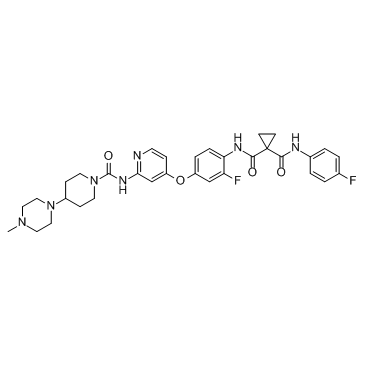928037-13-2
| Name | 1-N'-[2-fluoro-4-[2-[[4-(4-methylpiperazin-1-yl)piperidine-1-carbonyl]amino]pyridin-4-yl]oxyphenyl]-1-N-(4-fluorophenyl)cyclopropane-1,1-dicarboxamide |
|---|---|
| Synonyms |
Golvatinib
N-(2-Fluoro-4-{[2-({[4-(4-methyl-1-piperazinyl)-1-piperidinyl]carbonyl}amino)-4-pyridinyl]oxy}phenyl)-N'-(4-fluorophenyl)-1,1-cyclopropanedicarboxamide Golvatinib (USAN) UNII-516Z3YP58E E7050 cc-653 E-7050 |
| Description | E-7050 is a potent dual inhibitor of both c-Met and VEGFR2 kinases with IC50s of 14 and 16 nM, respectively. |
|---|---|
| Related Catalog | |
| Target |
VEGFR2:16 nM (IC50) c-Met:14 nM (IC50) |
| In Vitro | E7050 potently inhibits phosphorylation of both c-Met and VEGFR-2. E7050 also potently represses the growth of both c-met amplified tumor cells and endothelial cells stimulated with either HGF or VEGF. E7050 strongly inhibits the growth of MKN45, EBC-1, Hs746T, and SNU-5 tumor cells with IC50 values of 37, 6.2, 23, and 24 nM, respectively. The growth of A549, SNU-1 and 0MKN74 tumor cells is inhibited by E7050 with much higher IC50 values[1]. E7050 circumvents resistance to all of the reversible, irreversible, and mutant-selective EGFR-TKIs induced by exogenous and/or endogenous HGF in EGFR mutant lung cancer cell lines, by blocking the Met/Gab1/PI3K/Akt pathway in vitro. E7050 also prevents the emergence of gefitinib-resistant HCC827 cells induced by continuous exposure to HGF[2]. |
| In Vivo | E7050 shows inhibition of the phosphorylation of c-Met and VEGFR-2 in tumors, and strong inhibition of tumor growth and tumor angiogenesis in xenograft models. Treatment of some tumor lines containing c-met amplifications with high doses of E7050v (50–200 mg/kg) induced tumor regression and disappearance. In a peritoneal dissemination model, E7050 shows an antitumor effect against peritoneal tumors as well as a significant prolongation of lifespan in treated mice[1]. E7050 plus gefitinib results in marked regression of tumor growth associated with inhibition of Akt phosphorylation in cancer cells[2]. |
| Cell Assay | Cells (1000-3000 cells/100 μL/well) are seeded on 96-well culture plates with various concentrations of E7050 and cultured for 3 days. Then, 10 μL of WST-8 reagent is added to each well, and absorbance is measured at 450 nm compared with a reference measurement at 660 nm using a MTP-500 microplate reader[1]. |
| Animal Admin | Mice: Nude mice bearing MKN45, Hs746T, SNU-5, or EBC-1 tumors are administered E7050 (25, 50, 100, 200 mg/kg) or vehicle only as a control, once a day. Tumor volume is measured using calipers on the indicated days (0-15 days)[1]. |
| References |
| Density | 1.4±0.1 g/cm3 |
|---|---|
| Boiling Point | 867.5±65.0 °C at 760 mmHg |
| Molecular Formula | C33H37F2N7O4 |
| Molecular Weight | 633.688 |
| Flash Point | 478.5±34.3 °C |
| Exact Mass | 633.287537 |
| PSA | 126.12000 |
| LogP | 2.03 |
| Vapour Pressure | 0.0±3.3 mmHg at 25°C |
| Index of Refraction | 1.671 |
| Storage condition | -20℃ |
